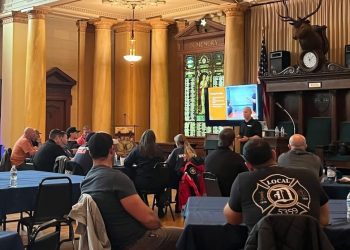EUGENE, Ore. – On April 15, a group of demonstrators gathered outside the Eugene Public Library to protest how taxpayer dollars are allocated, particularly in regard to military spending. The rally, organized by volunteers with the “Planet Versus Pentagon” and the “Community Alliance of Lane County,” coincided with Tax Day, a symbolic moment to raise awareness about national budget priorities.
As part of the demonstration, participants were encouraged to take part in a “penny poll.” Each person was given 10 pennies and asked to place them in jars labeled with various categories, including education, healthcare, housing, infrastructure, and military spending. The goal was to show how individuals would prefer their tax dollars to be spent, with a clear emphasis on redirecting funds away from military expenditure and towards social services that directly benefit communities.
Sue Barnhart, a volunteer with Planet Versus Pentagon, explained the group’s stance, emphasizing the need for a shift in funding priorities. “Most of our tax money is going to the military, it’s going to killing people, and what we would like is the money to go to helping people live better,” Barnhart said. She pointed to recent budget cuts affecting public libraries and education as additional reasons for the protest, which aimed to highlight the diminishing resources for essential services.
The demonstration was not an isolated event. According to the volunteers, the protest marked the latest in a series of annual Tax Day actions organized by Planet Versus Pentagon, a group that has been raising awareness about the need for budget reform for decades. These protests are part of a broader national movement that calls for a reallocation of government spending to address critical social issues, such as poverty, healthcare, and public education.
The rally at the Eugene Public Library serves as a reminder that Tax Day is not only a moment for individuals to reflect on their financial obligations but also an opportunity to reconsider how public funds are distributed. While the protestors’ message was clear, it remains to be seen whether their actions will influence public opinion or lead to changes in policy at the local or national level.














